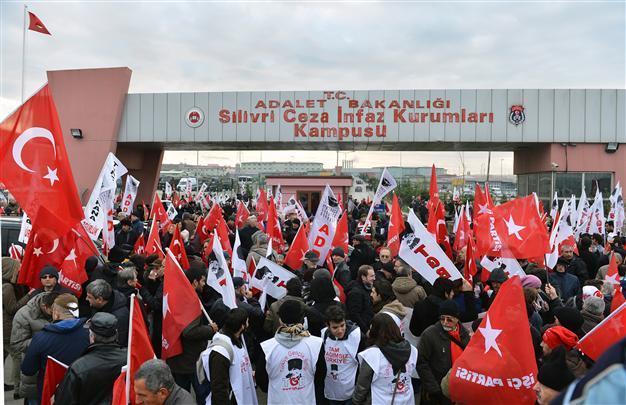Gendarmerie fires pepper gas at Ergenekon trial
ISTANBUL - Hürriyet Daily News

AA Photo
Clashes occurred between protesters and security teams in front of the court, as thousands gathered in Silivri today for the critical 270th hearing of the Ergenekon trial.
Gendarmerie forces have been using pepper gas and pressurized water to disperse people trying to pass over police barricades to enter the court.
Extra police officers have been dispatched to the court to reinforce security as tension escalated.
The prosecutor is expected to give his closing statement at today's critical hearing.

This photo shows inside of the court in Silivri.
Photo taken by CHP deputy PM Umut Oran.
Coup-plot trial approaches end after almost five yearsThe Ergenekon trial, which has left an indelible mark on Turkey over the last four years, will mark a milestone today as the prosecutor gives his closing statements regarding at the trial’s 270th hearing.
Opposition groups led by the main opposition the Republican People’s Party (CHP) have planned to hold a major rally in front of the Silivri courthouse where the case has been tried.
The CHP called on party members to attend today’s hearing, saying they have no interest in remaining silent in the face of “inquisition-style revenge at the Silivri concentration camps.”
The court board is expected to deliberate following the prosecutor’s closing argument. Suspects listed in the trial will be asked for their final statements and the court board will then move to make a ruling.
‘Ultra-nationalist gang’Throughout the legal case prosecutors have argued that Ergenekon, whom they’ve described as “an ultra-nationalist shadowy gang” involved in many dark murders in Turkey’s recent history, was organized by journalists, former generals, academics and writers. They’ve also accused the organization of plotting to overthrow the ruling Justice and Development Party (AKP).
The case was opened after 27 hand grenades were found in a chantey house in Istanbul’s Anatolian slum, Ümraniye on June 12, 2007.
The first indictment of the case was some 2,455 pages and came one year after the trial’s launch on July 2008. It was against 86 suspects, 46 of whom were taken under arrest, including retired Gen. Veli Küçük and leader of the Workers’ Party (İP) Doğu Perinçek.
A second indictment hit 56 suspects in 2009. This time Mustafa Balbay, former Ankara bureau chief of daily Cumhuriyet, a newspaper renowned for its critical stance against the AKP, was listed among the suspects. Since then some 21 separate indictments have been merged and the testimonies of 160 witnesses, 44 of who are secret witnesses, have been heard.
Secret witnesses were one of the most criticized aspects of the case. Şemdin Sakık, a former top militant of the outlawed Kurdistan Workers’ Party (PKK) and a close aide of its convicted leader, Abdullah Öcalan revealed his identity as a secret witness Nov. 6, shocking much of the public following the case.
From the very beginning defendants in the case asserted that Ergenekon was fictitious, being merely a made-up scenario to allow the AKP to arrest its most outspoken critics.
The case was then merged with the Internet Memorandum case and the Action Plan against Reactionism.
One of the landmarks of the case came Jan 6, 2012, when retired Chief of Staff, İlker Başbuğ, was arrested on charges of “attempting to overthrow the government through use of force” and “leading a criminal organization.”
Başbuğ refused to file a plea in court and did not attend any of the case’s trials from then on except when the Former Chief of General Staff Ret. Gen. Hilmi Özkök gave his testimony.
Over the case of the trial lawyers for the many defendants complained many times about the court board’s violation of fair trial rules and long detention periods that have turned into “de facto sentences.”

